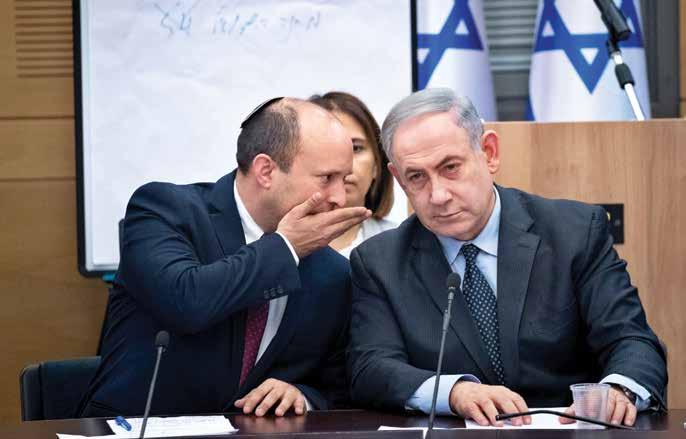
7 minute read
ISRAEL: One Right Exits, One Right Enters, India in ‘Center’
By Anca Verma
Advertisement
Israelis are very much like Indians, they respect education and family values and are good with ‘jugaad,” the moment Naftali Bennett had said to the IIT Delhi students, claps and laughter swept the atmosphere. The Israeli leader said this back in 2013 about the probable relationship that India and Israel will share under his leadership in future; more specifically in the domains of economy, military and geo-strategy. The reason Naftali Bennett has become too important for the day is that the right-wing party led by him is now forming a coalition government in Israel which will see the exit of Benjamin Netanyahu, another right winger. Under the novel
coalition, Bennett and Yair Lapid, leader of the Yesh Atid party, would rotate the role of prime minister, with Bennett taking up the post for the first two years and Lapid the final two. Its noteworthy here that Bennet’s party has won mere seven seats in the national parliament.
Lapid, a former TV presenter and a secular centrist, was tasked with forming a government by President Reuven Rivlin after Netanyahu again failed to put together his own coalition following Israel’s fourth election in less than two years. Netanyahu’s Likud and his natural allies have won 52 seats in the 120-seat Knesset, Israel’s parliament in the March 23, 2021 election that’s he was unable to form a majority with his natural allies.
After Polls results, several of Netanyahu’s opponents have started discussing advancing a bill to disqualify a politician under indictment from being tasked with forming a government, a measure aimed at barring the longserving prime minister from office. A similar bill was floated after the March 2020 elections, but was never passed. Netanyahu is on trial for fraud, breach of trust and accepting bribes in three cases. He has denied any wrongdoing and has dismissed the charges as a witch-hunt by biased law enforcement and media. Despite the charges against him, Netanyahu’s Likud party received about a quarter of the votes, making it the largest party in parliament. A total of 13 parties received enough votes to enter the Knesset – the most since the 2003 election– and represent a variety of ultra-Orthodox, Arab, secular, nationalist and liberal factions.

Naftali Bennett: A Rightist of His Own Kind
The newly declared Prime Minister, who happens to be 49-years-old, was born to American parents and is a former tech entrepreneur who made millions before switching to, and getting deeply involved in, rightwing politics and a religious-nationalist political position.
The 49-year-old, who has made pitches to far-right voters throughout his career, leads the Yamina party, which has called for Israel to annex parts of the occupied West Bank. A firebrand politician who has not shied away from controversy, Bennett is ultra-liberal on the economy and takes an aggressive line against Iran. Fluent in English and media-savvy, Mr Bennett frequently appears on foreign TV networks, defending Israel's actions. Blunt talking and combative, in a domestic television debate he once admonished an Israeli Arab member of parliament for saying Jews had no right to settle in the West Bank, telling him: "When you were still swinging from trees, we had a Jewish state here."
Bennett rejects the notion of the

creation of a Palestinian state alongside Israel - the so-called two-state solution to the Israeli-Palestinian conflict (an issue he has likened to "shrapnel in the buttocks") advocated by much of the international community, including US President Joe Biden.
The leader was once considered a protégé of Netanyahu, whom he served as chief of staff from 2006 to 2008, until the pair fell out. He left Netanyahu's Likud party and joined the right-wing national religious Jewish Home party, entering parliament after leading it to success in the 2013 election.
He shares this ideology with Netanyahu and has served in several of the Likud leader’s governments. In recent years, however, the two have become increasingly opposed. He went on to serve as a minister in every coalition government until 2019, when his newly formed New Right alliance failed to win any seats in that year's election. Just 11 months later, Bennett reversed the loss, returning to parliament as head of Yamina (Hebrew for "rightwards").
In 2013, he said Palestinian “terrorists should be killed, not released”. Often labelled an ultranationalist (he has described himself as "more right-wing" than Netanyahu), Naftali Bennett is outspoken in his advocacy of Israel as the Jewish nation state and Jewish historical and religious claims to the West Bank, East Jerusalem and the Syrian Golan Heights - territory occupied by Israel since the 1967 Middle East war.
In opposition and with the coronavirus pandemic raging in 2020, Bennett dampened his right-wing rhetoric to focus on the health crisis, moving to broaden his appeal by releasing plans to contain the virus and aid the economy.
He is Like Modi
Political observers regard Bennett of having same national objectives as the government of Narendra Modi in India. He too has taken a hard line in dealing with the threat from Palestinian militants, for whom he has said he supports the death penalty. He objected to a truce with Gaza's Hamas rulers which ended a flare-up of fighting in 2018, and accused the group of effectively murdering dozens of its own civilians killed in Israeli air strikes carried out in response to rocket fire from Gaza in renewed

hostilities in May 2021.
In India, Prime Minister Modi tenure revoked the special status of Jammu and Kashmir. His administration also introduced the Citizenship Amendment Act and taken tough action on Pakistan as the Indian Army had conducted surgical strikes on terror launch pads in Pakistani side of Kashmir under his leadership.
Tightening the Ties
As of 2014, India is the third-largest Asian trade partner of Israel, and tenth-largest trade partner overall. In 2014, bilateral trade, excluding military sales, stood at US$4.52 billion. Relations further expanded during Prime Minister Narendra Modi's administration, with India abstaining from voting against Israel in the United Nations in several resolutions
Even recently, India abstained from voting on the United Nations Human Rights Council's (UNHRC) resolution to open an international investigation into violations with regard to the recent Gaza violence. The resolution was nevertheless passed, with 24 of the council's 47 members voting in favour of the probe.
According to an international poll conducted in 2009, 58% of Indians expressed sympathy with Israel, compared with 56% of Americans.
Not only India, the United States is not a member of the rights council and U.S. officials opted not to speak during the council debate. But after the vote, the United States condemned the decision, calling it “a distraction” that contributes nothing to humanitarian and diplomatic efforts and instead “threatens to imperil the progress that has been made in recent weeks., reported The New York Times.
It means India’s permanent representative (PR) to the UN, Ambassador TS Tirumurti had taken good decision what New Delhi asked him do at the UN Security Council. Tirumurti had reiterating in a statement that India’s strong support to the ‘just Palestinian cause’ and its unwavering commitment to the twostate solution. Israel is represented through an embassy in New Delhi, and one consulate each in Mumbai and Bengaluru. India is represented through its embassy in Tel Aviv.
India is the largest buyer of Israeli military equipment and Israel is the second-largest defence supplier to India after Russia. From 1999 to 2009, the military business between the two nations was worth around $9 billion. Military and strategic ties between the two nations extend to intelligence sharing on terrorist groups and joint military training As of 2015, the two nations are negotiating an extensive bilateral free trade agreement, focusing on areas such as information technology, biotechnology, and agriculture. n











